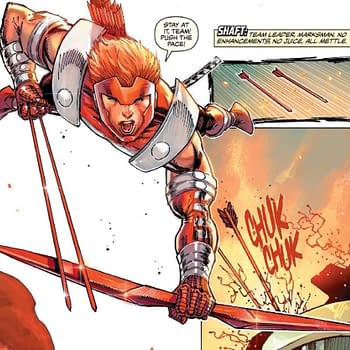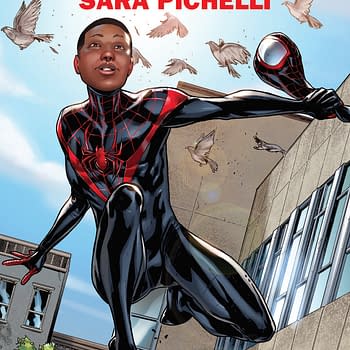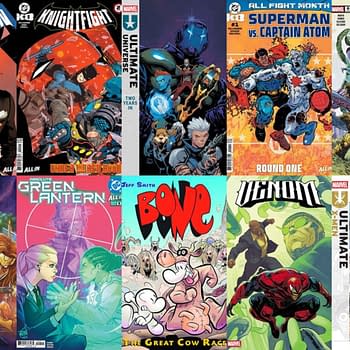Posted in: Comics, Recent Updates | Tagged: Alan Moore, gary spencer millidge, storyteller
Alan Moore: Storyteller – Review By Greg Baldino

Alan Moore upsets people.
Emotionally, it's usually their own choice. People get upset that his work in the 1980s made comics "dark," "serious," and "not fun anymore." There are comics readers who find him pretentious, arrogant, and boisterous; elevating an entertainment form onto an artistic pedestal at the expense of their own preferences, evoking Rube Golderberg's rebuke to Will Eisner for daring to consider cartooning a meritorious discipline: "We're vaudevillians," said the great schematicist of the comics page. And some are upset when he does play the cabaret act, eschewing formalist experimentation and dialectic discourse for silly songs about ducks and superhero dalliances that are are neither deconstructed nor post-structuralist, (Hands up everyone who bought Deathblow:Byblows and regretted it. Yeah, me too.)
Intellectually, though, it's what makes him the distinct creative entity that he is. Philosophic upsets are not inherently bad things, and more often than not are welcomed. Works that challenge preconceived notions and prejudices set the brain alight, and Moore does that more often than most. While even the Northampton warlock himself would admit that he doesn't knock it out of the park every time (indeed, in the postscript to the collection of his first comic endeavor, his Maxwell the Magic Cat strip, Moore admits that there is probably a lot less going on in his "talking cat" shenanigans than future collaborator Eddie Campbell proscribes to him in his introduction,) his works leave their mark everywhere he traffics in the medium, whether in concept or construction.
There remains still only a small selection of works focused on the man and his meter. Subtract the plethora of Watchmen analysis that emerged in conjunction with the movie adaptation and there are fewer still. Though his detractors may grumble and mutter in the back parlors of the internet about any effort of focus towards him, those few studies are minuscule compared to the vast body of essays discussing James Joyce, literatures most comparable figured in terms of the equality of reverence and revilement. Into this comparatively small pocket of biography and study (seriously, why is it you could staff a whole bookshop with books about Hitler and only prop up a wobbly table with anything on Brendan McCarthy?) comes Gary Spencer Millidge's Alan Moore: Storyteller, a lavish and exhaustive tome on Affable Al's life and work.
Drawing from a nearly endless well of interviews and articles in print, television, radio, and the web; Millidge takes us through Moore's life and work played out against the backdrops of the comics industry, his hometown of Northampton, and the world at large. No labor is too small for consideration as a part of the whole, and even minor works such as Skizz and the hideously obscure Outbreak of Violets get their moment under the microscope. Written as a third-person biography, it stands out from the most recent portraits, book-length interviews by Bill Baker and George Khoury, in its point of perspective, being able to chart a map that intersects with Moore's own but is not constrained to it. Millidge previously published the tribute anthology Alan Moore: Portrait of an Extraordinary Gentleman, and his own self-published comic Strangehaven would not likely have found a readership had Moore not plowed those fields with his challenging works beforehand. It's a work that exudes focus, dedication, and passion .
Following suit with the driving fascination of the text, the book itself is an art object in and of itself. Bursting at the page edge with illustrations ranging from the necessarily obligatory (reprints of covers and interior pages) to the downright gemlike (ranging from a full-size reprint of the script to a never published chapter of V for Vendetta to the plot charts for Big Numbers.) It would have been lovely if every comic page reproduction could have gotten the full-page treatment, but it's doubtful that all of the copyright holders would have been agreeable, and frankly at over three hundred full-color pages it's already a big damn book.
Rounding out the scope of Storyteller, is a tribute to Moore's performance work that makes the book's $45 price tag seem almost cheap in consideration: an included CD with nineteen tracks of his musical and spoken work work from the the early eighties to the late naughties. Most of the recordings have fallen out of print and several have never been released before.
For the Alan Moore fan or scholar, Storyteller is indispensable, encompassing three decades of creativity and experimentation, of accomplishment and failure. For the library looking to expand its set of reference works on the graphic medium, it not only stands up as substantial but all but guarantees a boost incirculation for the man's works. As the final chapters taper off the book with the nearly complete novel Jerusalem and the now sadly inert magazine Dodgem Logic, it does beg the question of what will be Moore's next project to render this volume incomplete?
Alan Moore: Storyteller, by Gary Spencer Millidge is published by Universe Publishing for $45 in the US, and by Ilex Press in the UK for £25
Greg Baldino writes various things, but mostly comics journalism, in various places, but mostly Chicago. His short story "Blumenkraft" was published in the comics anthology War: The Human Cost. He was once sold a piece of paper with Alan Moore written on it for ten cents, which is a testament to either his gullibility as a consumer or his affirmed belief in life-as-performance-art. He can be contacted, in theory at greg.baldino@gmail.com, although none of his replies have ever successfully passed the Turing test.















